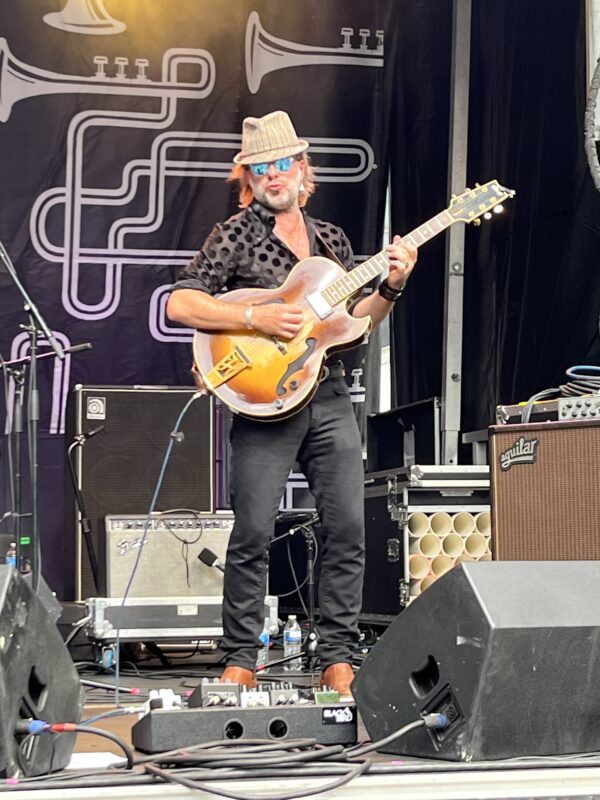The Pittsburgh International Jazz Festival moved back to the street last year, with two stages set up within a two-block stretch of Liberty Avenue in Downtown. In the wake of COVID, the weekend event had moved across the Monongahela River to Highmark Stadium for 2021 and 2022, where two massive stages took over the turf and gave everyone room to stretch out and soak up the music. Now that it has returned to its original spot, once again making it a largely free event (September 19-21), the festival again feels like a community happening, with an intimacy coming from the outdoor stages to the crowd and back.
Pittsburgh is a town that revels in its past, where the local PBS station produced a compelling documentary about bygone places called Things That Aren’t There Anymore, followed by Stuff That’s Gone. The same can be said about the Steel City’s jazz heritage. Where would the music if we hadn’t raised Ray Brown, Art Blakey, Erroll Garner and Billy Strayhorn? The locals love to bring that up a lot, but it’s a legitimate question.
Janis Burley, the President and CEO of the August Wilson African American Cultural Center, curates the event with a goal to introduce new artists while simultaneously paying tribute to the musicians who have been innovators. The year, number 15 for the festival, the weekend took care of both ends, spotlight rising stars and paying deep tribute to one of its most famous natives.
The August Wilson Center hosted A Tribute to George Benson on Friday, September 19. It was the weekend’s one ticketed set, and the 492-seat theater sold out a few weeks prior. Guitarist Dan Wilson, who hails just down the road in Toledo, Ohio, led the ensemble, with South African guitarist Jonathan Butler joining him on vocals and additional guitar for most of the evening.
With a varied career like Benson’s, the program covered all bases, from early rapid-fire blues lines (“The Cooker”) through the vocal ballads (“The Greatest Love of All,” “This Masquerade”), ending with “Gimme The Night,” which felt like it shifted away from the original’s four-on-the-floor beat. Butler’s vocals were prominent throughout the set, but there was still room for wailing from both Wilson and guitarist Cecil Alexander.
In addition to celebrating past masters, the festival also shone a light on an early, unsung innovator. Burley found out about Leon Hefflin Sr., whose Cavalcade of Jazz Festival predated the Newport Jazz Festival, running in Los Angeles from 1945 to 1958. The annual happening hosted everyone from Count Basie to Woody Herman and Louis Jordan, taking place often in LA’s original Wrigley Field. Burley invited Hefflin’s granddaughter to appear in a discussion of the Cavalcade’s history, complete with a PowerPoint of visuals, which will appear in a forthcoming book, The Impresario: Leon Hefflin and the World’s First Annual Jazz Festival.

Both weekend days were lucky enough to have perfect weather, none of the Pittsburgh humidity and, thankfully, no rain. True to Burley’s vision, the roster featured Branford Marsalis and Tarbaby as cornerstones, with newer groups that push the envelope. On Sunday, Nathan-Paul and The Admirables emphasized tight riff passages over improvisation, but their overall attack created excitement that straddled a Maceo Parker–style party atmosphere with John Coltrane–style dynamics. Guitarist John Shannon (who co-owns and curates the jazz club Con Alma), broke away from standard organ trio expectations with his set, balancing thoughtful originals and a funky take on Ahmad Jamal’s “Marseilles.”

Christone “Kingfish” Ingram might not be considered a jazz artist, but the massive blues guitarist hit the stage with a solid boogie groove that made everyone forget about genres for quite a while. His set also included a healthy dose of slow R&B (and an even bigger dose of volume, which reverberated down the street) but it became clear why Ingram has drawn so much praise. He knows how to work a crowd.
But few can hypnotize one like Dee Dee Bridgewater. As dusk fell on Downtown and the multi-award-winning vocalist dug into her set, her magnetism made the outdoor surroundings fade away, creating the aura of being in a theater. After receiving a Jazz Luminary Award from Burley, she and her all-women trio (pianist Carmen Staaf, bassist Heather Marks, drummer Shirazette Tinnin) dove into a set that expressed the idea “We exist,” said Bridgewater, to prove emphatically that women get representation in the jazz world.
Nina Simone’s furious “Mississippi Goddam” was composed in the wake of a church bombing in that state. Bridgewater is the rare singer who can both pay tribute to Simone and conjure up the fury of the original, reminding everyone it’s more than a song. She also proved that the message hasn’t dimmed in over half a century.
Like Simone, Bridgewater sang other people’s songs and made them her own. The Stylistics’ “People Make the World Go Round” kicked things off with an optimistic feeling while Bob Dylan’s “Gotta Serve Somebody” became a command, as if Bridgewater charted a course for all of us.
After that rousing performance, Bilal’s festival-closing set might have felt a little anticlimatic, but no one was ready to leave Liberty Avenue yet. In fact space for folding chairs was hard to find. But Bilal, like Bridgewater a hyphenated singer who has crossed numerous genres, had the crowd cheering from the moment he hit the stage. JT
